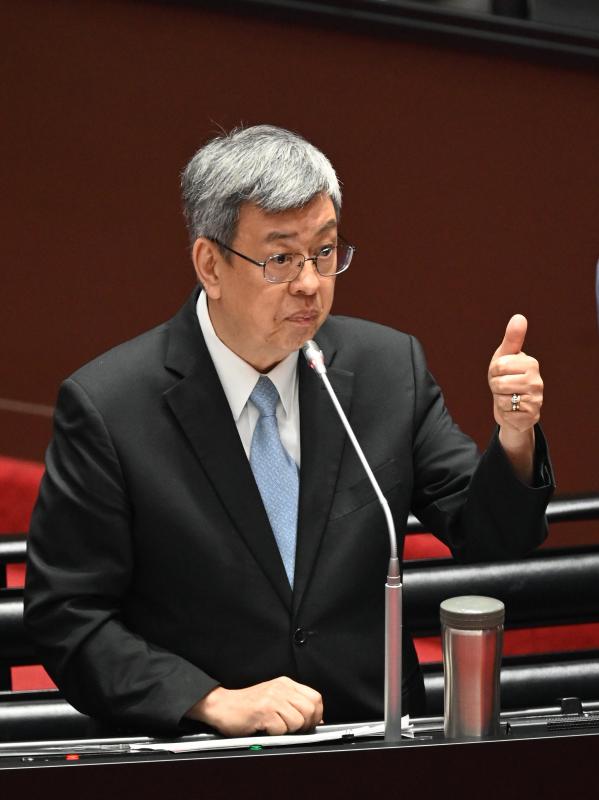The Indigenous Defense Submarine program is important to maintain Taiwan’s stability, so party caucuses should discuss funding proposals rationally and reasonably, Premier Chen Chien-jen (陳建仁) said yesterday amid reports that Chinese Nationalist Party (KMT) Legislator Ma Wen-chun (馬文君) has proposed 135 motions to cut or freeze national defense budget proposals, including for the program.
The legislature’s National Defense and Foreign Policy Committee is to review the national defense budget next week.
Legislative Yuan records show that Ma has made 121 proposals to freeze NT$1.29 billion (US$39.91 million) of defense spending and cut NT$180 million, alongside 14 other proposals to slash funds for classified projects.

Photo: Wang Yi-sung, Taipei Times.
Citing a lack of submarine testing experience, Ma proposed freezing NT$300 million of the program’s funding, with the money to be made available after program officials and the Ministry of National Defense brief the legislature on the details of testing procedures.
KMT Legislator Liao Wan-ju (廖婉汝) also proposed a NT$30 million budget freeze, citing delays in 2021 and last year of project implementation and questioning the ministry’s intent for allotting funding for a prototype submarine well into 2025.
The funding would be available once the ministry submits a report addressing her questions and the legislature finds it satisfactory, Liao said.
The ministry allotted NT$3.93 billion for the program next year to cover the costs of optimizing the prototype submarine.
The KMT caucus yesterday issued a notice in support of Ma.
The Democratic Progressive Party (DPP) has governed for seven years with a legislative majority, and it is not news that its legislators are only parroting the party stance instead of upholding the public’s interests, the statement said.
Ahead of planned defense budget reviews, the DPP has malignantly distorted Ma’s proposals in “an act of revenge,” when she exercised her constitutional duty of government oversight, it said.
Freezing funds is a tool employed by the eight standing legislative committees to ensure that the government observes fiscal responsibility, which is in line with the checks and balances nature inherent in a democratic system, the KMT said.
DPP lawmakers ignoring their duties of government oversight and slandering opposition legislators for doing their jobs should be condemned, it said.
Separately, the DPP caucus said that the KMT’s proposals were an abuse of legislative power.
DPP Legislator Hung Sun-han (洪申翰) said that while lawmakers are allowed to cut and freeze budgets, the power should not be abused for personal vengeance.
Ma’s actions could be construed as an open threat to the administrative arm of government, Hung said.
Meanwhile, Minister of National Defense Chiu Kuo-cheng (邱國正) declined to comment on the budget proposals, saying that legislators were doing their jobs.
Chen said that the submarine program is important to bolster the nation’s coastal frontier defense, maintain Taiwan’s stability and peace in the region, so hopefully the caucuses would discuss the issue rationally and supervise the government reasonably.
Additional reporting by Chen Cheng-yu and Yu Kai-hsiang

A magnitude 7.0 earthquake struck off Yilan at 11:05pm yesterday, the Central Weather Administration (CWA) said. The epicenter was located at sea, about 32.3km east of Yilan County Hall, at a depth of 72.8km, CWA data showed There were no immediate reports of damage. The intensity of the quake, which gauges the actual effect of a seismic event, measured 4 in Yilan County area on Taiwan’s seven-tier intensity scale, the data showed. It measured 4 in other parts of eastern, northern and central Taiwan as well as Tainan, and 3 in Kaohsiung and Pingtung County, and 2 in Lienchiang and Penghu counties and 1

A car bomb killed a senior Russian general in southern Moscow yesterday morning, the latest high-profile army figure to be blown up in a blast that came just hours after Russian and Ukrainian delegates held separate talks in Miami on a plan to end the war. Kyiv has not commented on the incident, but Russian investigators said they were probing whether the blast was “linked” to “Ukrainian special forces.” The attack was similar to other assassinations of generals and pro-war figures that have either been claimed, or are widely believed to have been orchestrated, by Ukraine. Russian Lieutenant General Fanil Sarvarov, 56, head

FOREIGN INTERFERENCE: Beijing would likely intensify public opinion warfare in next year’s local elections to prevent Lai from getting re-elected, the ‘Yomiuri Shimbun’ said Internal documents from a Chinese artificial intelligence (AI) company indicated that China has been using the technology to intervene in foreign elections, including propaganda targeting Taiwan’s local elections next year and presidential elections in 2028, a Japanese newspaper reported yesterday. The Institute of National Security of Vanderbilt University obtained nearly 400 pages of documents from GoLaxy, a company with ties to the Chinese government, and found evidence that it had apparently deployed sophisticated, AI-driven propaganda campaigns in Hong Kong and Taiwan to shape public opinion, the Yomiuri Shimbun reported. GoLaxy provides insights, situation analysis and public opinion-shaping technology by conducting network surveillance

‘POLITICAL GAME’: DPP lawmakers said the motion would not meet the legislative threshold needed, and accused the KMT and the TPP of trivializing the Constitution The Legislative Yuan yesterday approved a motion to initiate impeachment proceedings against President William Lai (賴清德), saying he had undermined Taiwan’s constitutional order and democracy. The motion was approved 61-50 by lawmakers from the main opposition Chinese Nationalist Party (KMT) and the smaller Taiwan People’s Party (TPP), who together hold a legislative majority. Under the motion, a roll call vote for impeachment would be held on May 19 next year, after various hearings are held and Lai is given the chance to defend himself. The move came after Lai on Monday last week did not promulgate an amendment passed by the legislature that